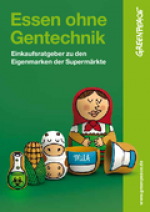GMO news related to Germany
21.05.2015 | permalink
In unusual move, German scientists lobby for GM labeling
BERLIN—When it comes to labeling genetically modified (GM) food, the battle lines are usually clear: Those who oppose genetic engineering want it labeled, and those who support it see no need. But today, a group of German scientists and other proponents of GM organisms launched a campaign to require labeling of anything that contains or has been produced with the help of GM organisms.
Their unusual plea is a political gamble; rather than making it more difficult for GM products to reach consumers, they hope the new law will show Germans just how widespread such products already are—whether it’s in food, clothes, drugs, or washing powder—and that there is nothing to be afraid of.
The petition to the German parliament, which will go online tomorrow, asks the German government to prepare a law that requires GM labeling for all food, feed, drugs, textiles, chemicals, and other products that have been produced using genetic engineering. The petition also calls on the government to advocate a similar law at the E.U. level.
13.05.2015 | permalink
REWE Group removes glyphosate herbicides from its DIY range
The REWE Group’s 350 toom Baumarkt DIY stores will carry no glyphosate products after September 30, 2015
The 350 toom Baumarkt DIY stores belonging to the REWE Group will carry no glyphosate-containing products later than September 30, 2015. From today (11 May) such products cannot be re-ordered for the stores.
By the end of 2013 toom Baumarkt had begun to switch the range and had removed about 60 percent of glyphosate-containing products from sale. Toom Baumarkt offers its customers alternative environmentally acceptable products. Thus toom Baumarkt was well ahead of the upcoming decision on the extension of the EU approval for glyphosate.
"As a responsible company, it is important to regularly review our entire range and seek to protect the environment and nature with alternative and more sustainable options. Toom Baumarkt is constantly and consistently developing a more sustainable portfolio of products,” explains Dominique Rotondi, General Purchasing Manager for toom Baumarkt.
12.05.2015 | permalink

German states call for ban on household pesticide - politicians’ duty to protect people’s health
Germany’s state consumer protection ministers are calling for an EU-wide ban on the leading global pesticide Glyphosate, after it was categorised as carcinogenic by the WHO. However, the federal government sees no need for action. EurActiv Germany reports.
After reevaluating the most widely used pesticide in Germany and worldwide, the World Health Organization’s (WHO) cancer researchers have categorised Glyphosate as “probably carcinogenic to humans”.
In a resolution on Friday (8 May), Germany’s state ministers called for “the supply to and use by private persons to be banned for precautionary reasons”. In addition, the politicians argue that Glyphosate should be prohibited for uses close to consumers.
“This pesticide should not be found in gardens, parks or on children’s playgrounds. I also do not think use in private gardens is appropriate,” explained Lower Saxony’s Consumer Protection Minister Christian Meyer. He is the current chairman of the Consumer Protection Minister Conference.
- EurActiv: German states call for ban on household pesticide
- Federal Institute for Risk Assessment (BfR): BfR-contribution to the EU-approval process of glyphosate is finalised
- The Guardian: Glyphosate is a 'probably carcinogenic' pesticide. Why do cities still use it?
- Telegraph: Katharine Hamnett campaigns for ban on herbicides in parks
08.05.2015 | permalink

Berlin Declaration adopted at GMO-FREE EUROPE 2015
8th May 2015 in Berlin
400 participants from 60 countries today concluded the GMO-FREE EUROPE conference and vowed to continue and intensify their cooperation to keep the European Union free of GMOs, to develop a sustainable protein strategy for Europe and to collaborate with GMO FREE movements around the world.
In a joint declaration participants from the "three pillars" of the GMO FREE EUROPE Conference emphasize the four guiding principles and objectives: · Subsidiarity Principle, · Precautionary Principle, · Polluter-pays-Principle, · Freedom of choice for everybody and point out the following:
http://www.gmo-free-europe.org/press.html
Participants came from the following countries:
Albania, Argentina, Armenia, Australia, Austria, Belgium, Benin, Bosnia and Herzegovina, Brazil, Bulgaria, Canada, Croatia, Czech Republic, Ecuador, France, Gambia, Georgia, Germany, Ghana, Greece, Hungary, India, Ireland, Italy, Japan, Kenya, Kosovo, Latvia, Malawi, Malaysia, Mali, Mexico, Nepal, Netherlands, New Zealand, Nigeria, Northern Ireland, Norway, Poland, Portugal, Republic of Macedonia, Romania, Russia, Serbia, Sierra Leone, Slovenia, South Africa, Spain, Sweden, Switzerland, Tanzania, Togo, Turkey, Uganda, UK, Ukraine, USA, Uzbekistan, Zambia
07.05.2015 | permalink
GMO contamination risk is too high, say groups from Canada, Australia and Japan
Joint media release for Europe
7 May 2015, Berlin
Civil society organisations from Canada, Australia and Japan have jointly issued a warning about contamination risks from genetically modified organisms (GMOs), after the recent EU commission authorisation of 17 new GMOs for food and feed. They are visiting Europe for the GMO-FREE EUROPE Conference 2015 in Berlin 6-8th May.
“Learn the lessons from our countries - GMO is not worth the risk. If allowed, you will have GMO contamination of non-GM crops and nearby land for many years to come” said Jessica Harrison, Coordinator of the GM-Free Australia Alliance (GMFAA). “GM canola was first grown commercially in 2008 in Australia. We find GM canola weeds on roadsides, truck spillages have dispersed GM seeds and GM pollen has contaminated honey. GM-free Tasmania is still eradicating weeds from GM crops´ trials in the late 90’s”. In 2010, Organic farmer Steve Marsh, found GM canola and seeds had contaminated 2/3 of his farm. His ground-breaking court case for damages against his GM crop cultivating neighbour is still not resolved.
It’s been 20 years since Canada started growing GM canola/rapeseed. “Organic grain farmers in Canada have largely stopped growing canola because of GM contamination. For most farmers, it is no longer possible to grow, sell and export organic canola,” said Lucy Sharratt, Coordinator of the Canadian Biotechnology Action Network.
Japanese citizens acted quickly after GM canola weeds were found growing near harbours, cooking oil factories and roadsides throughout Japan. “We do not grow any GM crops in our country,” said Michiyo Koketsu from the NO! GMO Campaign in Japan. “Unfortunately GM canola is imported and crushed here. GM weeds grown from spilt seeds are flourishing and out-crossing with plant relatives such as native rapeseed, mustard and broccoli. An ad hoc response from the Japanese authorities meant that citizens groups, at their own cost, test and remove GM weeds to guard against further contamination.
Due to the body of evidence showing harm, GM food is rejected by consumers, if they know what they are eating. Growing demand for GMO-free food products has meant farmers turning their back on GM crops as they hurry to supply the expanding demand for non-GM crops. In Australia, non-GM canola is sold at an average of $40 per tonne more than GM canola concluded Jessica Harrison.
Notes:
(1) http://www.abc.net.au/news/2013-05-21/euro-canola-demand/4702890
Europe demanding more Australian non-GM canola
(2) http://www.producer.com/2013/05/non-gm-canola-oil-demand-has-crusher-scrambling/
Non-GM canola oil demand has crusher scrambling
Short presentations on the 7th May at Representation of Hesse (In den Ministergärten 5,10117 Berlin)
http://www.gmo-free-europe.org/program-info/7th-of-may-2015/ngos-and-scientists-network-of-gmo-free-regions.html
13:30 - 14:30
- Canada: Impacts and Lessons from 20 Years of GMOs
- GMO-Free in Australia, New Zealand and the Western Pacific
- The Consumer Led Anti-GMO Movement in Japan
Contacts in Berlin:
Lucy Sharratt, Coordinator of the Canadian Biotechnology Action Network
http://www.cban.ca/
coordinator@cban.ca
Jessica Harrison, Coordinator of the GM-Free Australia Alliance (GMFAA)
http://www.gmfreeaustralia.org.au/
gmcropwatch@gmail.com
+37259792097
Michiyo Koketsu, NO! GMO Campaign in Japan
http://www.gmo-iranai.org/
michiyokoketsu@gmail.com
- Zukunftsstiftung Landwirtschaft: GMO-FREE EUROPE 2015
- GMO-FREE EUROPE 2015: GMO-FREE EUROPE Workshops & Presentations
- Canadian Biotechnology Action Network - CBAN
- GM Free Australia Alliance :: To avert the threat of Genetic Manipulation (GM) in food and crops in Australia
- NO! GMO Campaign in Japan
- GMO contamination risk is too high, say groups from Canada, Australia and Japan
27.04.2015 | permalink
EU Commission approves 19 genetically engineered plants for import - Testbiotech to file a complaint
Never before has the EU Commission authorised so many genetically engineered plants for import on just one day. Last Friday, 19 genetically plants were granted market authorisation, 17 for usage in food and feed, and 2 are for flowers (carnations). 10 of the plants approved for food and feed are new authorisations, the others are re-approvals. The overall number of genetically engineered plants that can be imported into the EU for use in food and feed has now risen to 58. Testbiotech plans to file a complaint to set a precedent case.
“The risks of the genetically engineered plants are not investigated sufficiently and the combinatorial risks factors of these plants if mixed in a diet have not been assessed at all,” says Christoph Then for Testbiotech. “Neglecting to properly assess the risks of genetically engineered plants coupled with mass-authorisation is increasing risks and uncertainties in the food chain.”
Experts from several EU Member States have also criticised the deficiencies in EU risk assessment carried out by the by European Food Safety Authority (EFSA). However, the EU Commission ignored this criticism in its decision making process. Instead, it is suggesting new regulations that would allow each Member State to ban the import of genetically engineered plants. They would not, however, be allowed to use arguments such as health risks to justify their decision. Consequently, it would be almost impossible to defend such national bans against legal challenges.
There are substantial uncertainties about the risk assessment of these plants.
- testbiotech: EU Commission approves 19 genetically engineered plants for import - Testbiotech to file a complaint
- News | DW.DE: EU approves import of 19 genetically modified organisms
- Business Insider: The EU has approved the first GMO crops since 2013
- European Commission: Press release - Commission authorises 17 GMOs for food/feed uses and 2 GM carnations
- European Commission: Press release - Fact Sheet: Questions and Answers on EU's policies on GMOs
20.03.2015 | permalink

German government quarrels over GMO cultivation ban
Agriculture Minister Christian Schmidt hopes to create a legislative framework that would cover cultivation bans on genetically modified plants, but leave them up to the regions. Environment Minister Barbara Hendricks, meanwhile, is insisting on a national GMO ban. EurActiv Germany reports.
Barbara Hendricks has rejected a draft bill from Christian Schmidt for regional cultivation bans on genetically modified plants.
The bill is just an initial working draft, Hendricks said on Monday (16 March), in a statement to ZDF.
“It will still be voted on by the federal government,” she said.
The Social Democrat is calling for a national ban on the cultivation of genetically modified crops. This is important, she said, to achieve legal certainty. “If we have a fragmented cultivation ban, we would have an incredibly high amount of legal disputes,” Hendricks pointed out.
- EurActiv: German government quarrels over GMO cultivation ban
- Federal Government: Christian Schmidt, Federal Minister of Food and Agriculture
- Federal Government: Barbara Hendricks, Federal Minister for the Environment, Nature Conservation, Building and Nuclear Safety
- European Parliament: Parliament backs GMO opt-out for EU member states
- Greenpeace Germany
- International Law Office: Do the new EU GMO rules comply with its WTO obligations?
02.03.2015 | permalink
German states want nationwide ban on genetically engineered plants
Berlin (dpa) - The majority of Germany‘s 16 federal states would like a nationwide ban on the cultivation of genetically modified organisms, according to a survey carried out by dpa and published on Saturday.
If there is no nationwide ban, than some of the states will implement their own bans, the survey of the various state agriculture ministries found.
"We can‘t have a patchwork in Germany, so the federal government has to enact a ban," the agriculture minister for the northern state of Schleswig-Holstein, Robert Habeck, told dpa.
- German states want nationwide ban on genetically engineered plants | EUROPE ONLINE
- Germany to press EU for national right to ban GMOs before 2015 harvest | Reuters
- German Environment Ministry seeks unconditional GMO ban | EurActiv
- Schleswig-Holstein state: Minister for Energy Transition, Agriculture, Environment and Rural Areas Dr. Robert Habeck
- EU-Network of GMO-Free Regions
02.03.2015 | permalink
Coming out on top with TTIP - GMO, hormone-treated meat, chlorine-treated chickens
Interview with EU commissioner-designate for trade
The "Transatlantic Trade and Investment Partnership" (TTIP) between the EU and US will set the standard for the 21st century. With approximately 800 million consumers, it is expected to build the largest economy in the world by eliminating tariffs and trade barriers as well as lifting bureaucratic obstacles vanish.
Trade Commissioner Cecilia Malmström is negotiating TTIP terms on behalf of the 28 EU countries with the United States. In an exclusive interview with the "Luxemburger Wort" she highlights the benefits of this pact along with the fears and concerns of consumers.
(.....) Chlorine chicken became a symbol of TTIP. Will it end up on the plates of European consumers?
No, that's a myth. In Europe, we have high standards of consumer protection that will not be compromised by a trade agreement. Genetically modified foods are not allowed in Europe, hormone-treated meat is also taboo here, and chlorine-treated chickens are prohibited.
- Luxemburger Wort - Interview with EU commissioner-designate for trade, Coming out on top with TTIP
- Germany: T-TIP Could Force Germany to Abolish Plans for GMO Labeling | USDA Foreign Agricultural Service
- USDA GAIN Report Number: GM14040 - T-TIP could force Germany to abolish plans for GMO labeling
- TTIP: Confidential reports: FTA would be defeated by German GMO Policy - SPIEGEL ONLINE
- Malmström: Germany's TTIP debate 'more heated' | EurActiv
- EU Food Law, Germany - German march against EU-US trade deal draws 50,000 people
- TTIP – Regulatory cooperation | European Parliamentary Research Service
19.01.2015 | permalink

We are fed up!: 50,000 march against TTIP & GMOs in Berlin
A broad alliance of farmers, ethical consumers, and anti-capitalist activists staged a march through Berlin that numbered up to 50,000, to denounce the proposed TTIP treaty between the US and EU, and mass farming technologies.
More than 120 organizations joined the fifth annual ‘We are Fed Up!’ demonstration, which this year focused on the increased importation of American farming practices – such as genetic modification, frequent antibiotic injections for animals, and chemical meat treatments – following the implementation of the controversial Transatlantic Trade and Investment Partnership (TTIP).
(.....) Speaking at one of the Green Week events, Federal Agriculture Minister Christian Schmidt promised to address the issues raised by the demonstrators, and said that he welcomed the public display of opinion.
- We are fed up!: Thousands march against TTIP & GMOs in Berlin - RT News
- Thousands Of German Protesters To U.S. GMO Ag: We are Fed Up!
- Berlin Residents Protest Against Free Trade Agreement With US / Sputnik International
- Thousands take to Berlin streets to protest against TTIP agreement - MaltaToday
- We Are Fed Up: Annual Berlin march attracts tens of thousands of people | euronews
- After the We are fed up! demo is before the Action! | Agricultural and Rural Convention
